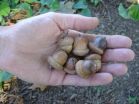(Press-News.org) Copenhagen, 16 March 2012: Depression increases the risk of death in patients who have a coronary stent implanted. After seven years of follow up, depressed patients were 1.5 times more likely to have died than non-depressed patients. The findings were independent of age, gender, clinical characteristics, anxiety and the distressed (Type D) personality.
The research was presented at the 12th Annual Spring Meeting on Cardiovascular Nursing, 16-17 March, in Copenhagen, Denmark.
Depression has been associated with poor outcomes in coronary artery disease but previous studies have mainly looked at short term effects, primarily in patients who have had a myocardial infarction or a coronary bypass operation. The current study (FPN 17) investigated the impact of depression on mortality during a 7-year follow up period in patients treated with percutaneous coronary intervention (PCI).
For the study, 1,234 PCI patients aged 26-90 years (average age 62) from the Rapamycin- Eluting Stent Evaluated At Rotterdam Cardiology Hospital (RESEARCH) registry completed the Hospital Anxiety and Depression Scale (HADS) to assess depression 6 months after having a stent implanted. The endpoint was all-cause mortality.
The prevalence of depression was 26.3% (324 out of 1234 patients). After 7 years there were 187 deaths in total (15.2%). The incidence of all-cause mortality in depressed patients was 23.5% (76 out of 324 patients) versus 12.2% (111 out of 910 patients) in non-depressed patients.
Depression was independently associated with all-cause mortality (hazard ratio=1.56; 95% confidence interval [1.03.35], p = .035) after adjusting for sociodemographics (age, gender), clinical characteristics, anxiety and the Type D personality. Clinical characteristics included type of stent (drug eluting/bare metal), number of vessels obstructed, body mass index, past cardiac surgery or myocardial infarction, indication for the PCI procedure, coronary risk factors (hypertension, hypercholesterolemia, diabetes, family history of cardiovascular disease, smoking) and cardiac medications (aspirin, ACE inhibitors, beta blockers, calcium antagonists, diuretics, nitrates and statins).
Male gender, older age, and diabetes mellitus were also significantly associated with an increased risk of death after 7 years of follow up, whereas statins were associated with a reduced risk. Anxiety and Type D personality had no significant effect on all-cause mortality.
"The main finding is that patients who are depressed after coronary stenting have a worse prognosis," says lead author Nikki Damen, a PhD student at Tilburg University in the Netherlands. "They die earlier than non-depressed patients."
The reasons for the finding are under investigation. One possible explanation is that depressed patients may have less healthy lifestyles with regard to smoking, drinking alcohol, physical activity, and diet, and may be less likely to take their medications. Another possible explanation is that depression could alter the activity of the sympathetic nervous system, leading to increases in heart rate and blood pressure.
"Doctors and nurses have traditionally focussed on medical factors like diabetes or family history of cardiovascular disease when assessing PCI patients' risk of death, but that's not the whole picture," says Ms Damen. "Psychological factors do matter as well, in combination with the medical factors."
She adds: "More research is needed to determine how to screen for depression in cardiovascular patients, and then how to provide treatment."
###
Authors: ESC Press Office
Tel: +33 (0) 4 92 94 86 27
Fax: +33 (0) 4 92 94 86 69
Email: press@escardio.org
Notes to editor
About the Annual Spring Meeting on Cardiovascular Nursing
The Annual Spring Meeting on Cardiovascular Nursing is the yearly meeting of the Council on Cardiovascular Nursing and Allied Professions (CCNAP) of the European Society of Cardiology (ESC). This year's meeting was organised jointly with the Professional Society for Cardiovascular and Thorax Surgery Nurses, based in Denmark.
About the Council on Cardiovascular Nursing and Allied Professions (CCNAP)
The CCNAP aims to promote excellence in Cardiovascular Nursing and Allied Professions through practice education and research. In addition to nurses, allied health professionals belonging to the CCNAP include physiotherapists, dieticians, psychologists, cath lab technicians, imaging and diagnostic technicians and therapists working in rehabilitation and prevention. The CCNAP is one of five Councils of the European Society of Cardiology.
About the European Society of Cardiology (ESC)
The European Society of Cardiology (ESC) represents 75,000 cardiology professionals across Europe and the Mediterranean. Its mission is to reduce the burden of cardiovascular disease in Europe.
References
Depression is independently associated with 7-year mortality in patients treated with percutaneous coronary intervention: results from the reseach registry
END
Copenhagen, 16 March 2012: Poor dental hygiene behaviours in patients with congenital heart disease are increasing their risk of endocarditis. Teens with congenital heart disease floss, brush and visit the dentist less than their peers. But they have healthier behaviours when it comes to alcohol, cigarettes and illicit drugs. Adults with single ventricle physiology (a type of congenital heart disease) also have poorer dental hygiene practices than their peers despite having better health behaviours overall.
The findings were presented in two studies at the 12th Annual ...
Messier 9, pictured here, is a globular cluster, a roughly spherical swarm of stars that lies around 25 000 light-years from Earth, near the centre of the Milky Way, so close that the gravitational forces from the galactic centre pull it slightly out of shape.
Globular clusters are thought to harbour some of the oldest stars in our galaxy, born when the Universe was just a small fraction of its current age. As well as being far older than the Sun — around twice its age — the stars of Messier 9 also have a markedly different composition, and are enriched with far fewer ...
For the first time, the melting of glaciers in Greenland could now be measured with high accuracy from space. Just in time for the tenth anniversary of the twin satellites GRACE (Gravity Recovery and Climate Experiment) a sharp image has surface, which also renders the spatial distribution of the glacial melt more precisely. The Greenland ice shield had to cope with up to 240 gigatons of mass loss between 2002 and 2011. This corresponds to a sea level rise of about 0.7 mm per year. These statements were made possible by the high-precision measurements of the GRACE mission, ...
Widely used antibiotics may increase incidence and severity of allergic asthma in early life, according to a University of British Columbia study.
The study, published today in the journal EMBO reports, shows that certain antibiotics that affect intestinal bacteria also had a profound impact on allergic asthma.
"It has long been suspected that kids exposed to more antibiotics – like those in developed countries – are more prone to allergic asthma," says the study's author, UBC microbiologist Brett Finlay. "Our study is the first experimental proof that shows how."
Finlay's ...
One of the world's leading Internet security experts, Eugene Kaspersky, has described the World Cyber Security Technology Research Summit at Queen's University Belfast as key in preventing a Cyber World War.
Eugene Kaspersky, CEO and co-founder of the largest antivirus company in Europe, Kaspersky Lab, will be giving a keynote address at the second annual Cyber Security Technology Research Summit on Friday 16 March.
The cyber security guru is joining some of the world's leading cyber security experts and government policy makers from around the world for a two-day meeting ...
PITTSBURGH, March 16 – Researchers at the University of Pittsburgh School of Medicine have identified a cell-signaling pathway that plays a key role in increasing insulin secretion during pregnancy and, when blocked, leads to the development of gestational diabetes. Their findings are available online today in Diabetes, one of the journals of the American Diabetes Association.
During pregnancy, pancreatic beta cells should expand and produce more insulin to adapt to the needs of the growing baby, explained senior investigator Adolfo Garcia-Ocana, Ph.D., associate professor ...
CHICAGO – In a study that included a nationally representative sample of nearly 45,000 adults, participants who met more of seven recommended cardiovascular health behaviors or factors (such as not smoking, having normal cholesterol levels, eating a healthy diet), had a lower risk of death compared to participants who met fewer factors, although only a low percentage of adults met all seven factors, according to a study appearing in JAMA. The study is being published early online to coincide with its presentation at a specialty meeting of the American Heart Association.
"Cardiovascular ...
The northeastern U.S. should prepare for a surge in Lyme disease this spring. And we can blame fluctuations in acorns and mouse populations, not the mild winter. So reports Dr. Richard S. Ostfeld, a disease ecologist at the Cary Institute of Ecosystem Studies in Millbrook, NY.
What do acorns have to do with illness? Acorn crops vary from year-to-year, with boom-and-bust cycles influencing the winter survival and breeding success of white-footed mice. These small mammals pack a one-two punch: they are preferred hosts for black-legged ticks and they are very effective ...
Nanoparticles containing chitosan have been shown to have effective antimicrobial activity against Staphylococcus saprophyticus and Escherichia coli. The materials could be used as a protective wound-healing material to avoid opportunistic infection as well as working to facilitate wound healing.
Chitosan is a natural, non-toxic and biodegradable, polysaccharide readily obtained from chitin, the main component of the shells of shrimp, lobster and the beak of the octopus and squid. Its antimicrobial activity is well known and has been exploited in dentistry to prevent ...
New biotechnological and chemical methods will facilitate efficient production of chemicals, materials and fuels from renewable natural resources. The Academy of Finland Centre of Excellence (CoE) in White Biotechnology – Green Chemistry Research focuses on the research and development of microbial cells, or cell factories, for producing new useful compounds from sugars in plant biomass. These compounds can be used, for example, for manufacturing bioplastics or in medical applications.
"By means of gene technology, we can modify microbial metabolism and thereby produce ...

